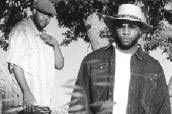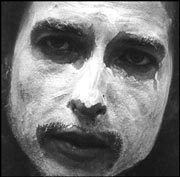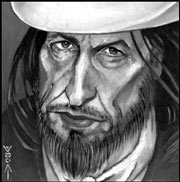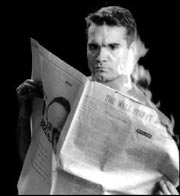BLACKALICIOUS SASQUATCH! FESTIVAL
with Ben Harper, String Cheese Incident, Jack Johnson, Galactic, Soulive, and Maktub The Gorge, 628-0888, $45.70 2 p.m. Sat., May 25
“MOVING THROUGH the darkness takes faith,” says Tim Parker, a.k.a. Gift of Gab, the high-verbal half of Bay Area alternative-rap duo Blackalicious. “That’s what Blazing Arrow is a reference to. There’s a line that talks about, you know, moving through the jungle with my fireball and my bow—that’s what this album is about. Having the faith to keep moving, keep moving even though life is hard. To keep the light in front of you and blaze the path.”
It’s hard to say how best to peg Blazing Arrow, the second full-length by Gab and Chief Xcel (Xavier Mosely). Call it alt-rap, call it underground hip-hop or funk-sample toasting—hell, call it straight poetry—all of those terms taken together just begin to describe one of contemporary rap’s most formidable collectives.
Moreover, calling Blackalicious’ new release their second album is downright misleading. In their 10th year of professional collaboration, Gab and Xcel first dropped in 1994 with the single “Swan Lake” on independent hip-hop label SoleSides; they’ve barely stopped since.
A minor classic in the underground hip-hop scene, “Swan Lake” was shortly followed by a rapid-fire string of singles and EPs on which Blackalicious carefully honed its sound. Xcel’s ear for R&B and soul sources, coupled with Gab’s inventive delivery and tendency toward esoteric lyrics, gave the duo a signature style. Though their spirituality called to mind positive-tip artists such as De La Soul and A Tribe Called Quest, Blackalicious’ musical sensibility was sharper, more aggressive, and a great deal more intricate.
1999’s A2G EP brought that sound to a wider audience. Tracks like the gleeful “Alphabet Aerobics (The Cut Chemist 2.5 Minute Workout)” pushed Xcel’s talents to the fore; the tongue-twisting title track showcased Gab’s lyrical prowess and was revisited a year later on the full-length release Nia.
“We spent three years on Nia,” says Gab. “We built it from the ground up.” Taking its title from the Swahili word for “purpose,” the album was packed to bursting at 74 minutes, but each one of its 19 cuts delivered on the promise of those early singles. Further, it proved that Blackalicious’ art wasn’t only suited to A- and B-sides; that Gab and Xcel could sustain their vision over such a sprawling album raised expectations for further work.
It also started a predictable bidding war. Both A2G and Nia were released on Quannum, the label Blackalicious had formed with the SoleSides crew in 1997, and both had sold remarkably well, even by mainstream standards. By late 2000, the year of Nia‘s release, Blackalicious had signed with MCA and begun mapping out the follow-up record.
Where Nia was a self-made if expansive project, Blazing Arrow aims to be a collaborative album from start to finish. The short list of guests indeed makes impressive reading; Zach de la Rocha, the Roots’ Questlove, Chali 2NA of Jurassic 5, D.C. poet Saul Williams (whose voice most will recognize from his leading role in the film Slam), Ben Harper, and Lateef the Truth Speaker all make appearances, trading lines and passing mikes like street-corner evangelists.
“With some people, it was an old friendship thing. We’ve known Questlove forever, so it just became a matter of getting out to Philly, where he is, and putting it down. We traveled a lot for this album,” Gab muses.
But perhaps the highest moment—Gab’s voice becomes animated even as he tells the story—was getting to work with the legendary Gil Scott-Heron on the rolling cut “First in Flight.”
“Aw, we were in the studio in New York, and I just stood there and said to myself, ‘I can’t believe I’m about to record with Gil Scott-Heron.’ He’s just so laid-back, so down to earth. And here’s a guy, you know, I grew up on his records. Such inspiration.”
Like Scott-Heron, Blackalicious borrows and lifts widely from the history of African-American music, but a dominant influence is urban ’70s soul, as on Scott-Heron sides like “Home Is Where the Hatred Is” or “When You Are Who You Are.” (“Really?” Gab says excitedly when he hears the comparison. “Oh, man. What a compliment.”) They also exude the I’m-still-here survivalism of that era’s best work, which is one of the elements that makes Blazing Arrow such an enjoyable record.
As Gab sums it up: “Keeping faith up front is hard, no doubt. But you just have to realize, shit’s fucked up . . . but it’s gonna get better.”








